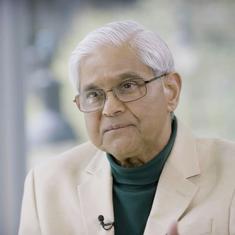The Big Story: Selective outrage
Two incidents this week have underscored the hypocrisy with which India treats the vital right of freedom of expression.
On Tuesday, pamphlets allegedly issued by Muslim clerics in Assam asked audiences not to attend a concert on March 25. The event was to feature 16-year-old Muslim singer Nahid Afrin, the winner of a television talent show. “If anti-Sharia acts like musical nights are held on grounds surrounded by masjids, idgahs, madrassas and graveyards, our future generations will attract the wrath of Allah,” the pamphlet said.
This was not a fatwa, as some newspapers reported. But when powerful clerics issue a diktat against an event, there is bound to be a chilling effect. Such proscriptions by religious figures have the potential to fuel violence against the person perceived as breaking a religious law, though in this case the threats have remained verbal till now.
This was not the case with Bollywood director Sanjay Leela Bhansali. Early on Wednesday, the sets of his film Padmavati were torched in Kolhapur in Maharashtra by a group of about 20 men, who threw petrol bombs on the sets. This was the second time the director has faced violence. In January, a group called Sri Karni Rajput Sena entered the film’s sets in Jaipur and assaulted Bhansali. The violence was the result of rumours that Bhansali’s movie portrayed Rani Padmavati, the legendary Rajput queen, in bad light.
Both these incidents are equally threatening to freedom of expression. While the first wants to propagate Islamic State-style regressive 9th century laws which ban music in Islam, the second is an attempt to force a sanitised narrative about a figure who probably did not even exist that bolsters the ideology of a few.
However, the response from those in the government was markedly different to them. Union Minister for Law and Justice, Ravi Shankar Prasad, promptly tweeted his support to the 16-year-old singer threatened by Islamic clerics. But Prasad chose silence when it came to Bhansali and the attack against him. The reason is not hard to guess. The question of Padmavati’s legacy is a sensitive subject in Rajasthan, a state the Bharatiya Janata Party currently rules. Those outraged by the film are part of its voter base. But in Assam, Muslim clerics do not vote the BJP, so condemning them becomes an easier task.
Selective outrage against attempts to muzzle freedom of expression has become a disease in India. Rather than acting against troublemakers, politicians have found ways to justify the violence by asking artists and writers to respect what they claim is popular sentiments. Government agencies have been used to perpetuate censorship, as is evident from the recent actions of Central Board of Film Certification refusing to clear some movies unless they made changes.
India’s rulers must understand that freedom of expression cannot be bargained with according to the circumstance. When it is sacrificed at the altar of political considerations, democracy takes a beating.
The Big Scroll
- Did Muslim clerics really issue a fatwa against Nahid Afrin in Assam? Arunabh Saikia finds out.
- Mrinal Pande on why the legend of Rani Padmavati offers room for interpretation.
- What does the controversy around Rani Padmavati tell us about our education system? Gaurav Garg explains.
Punditry
- Sanjaya Baru in the Indian Express on why the Uttar Pradesh election results require new interpretations to explain the rise of BJP and the fall of Congress.
- Vidya Ram in The Hindu on what the second Scottish referendum to the European Union and Brexit.
- In the Economic Times, Dhirendra Kumar says the time has come for customers to resist arbitrary charges levied by banks on services.
Giggles
'Little Down' @mail_today cartoon #RahulGandhi #UPResults2017 pic.twitter.com/96jZP7v9ij
— Satish Acharya (@satishacharya) March 16, 2017
Don’t miss
In this interview with Vrinda Gopinath, former Chief Election Commissioner SY Quarishi asserts that the Electronic Voting Machines cannot be tampered with.
“When the machines are ready to be sent to the states for polls, it is not us who decides which machines will be sent to a constituency and district – it is a computer that makes a randomised selection, as a first step to non-tampering. Next, when the machines are in the field, the EC [Election Commission] has put in place elaborate procedural checks to ensure there is no misuse and lapses. The first level check is to ensure the EVMs [Electronic Voting Machines] are functioning properly, and where we invite representatives of all political parties. This is done a few months before an election. Then, soon after the final candidate selection is done, which is just 13 days before the polling date, the machine is again tested in the presence of the candidate or party agent, after which they all have to sign a certificate that the EVMs are in order.”










